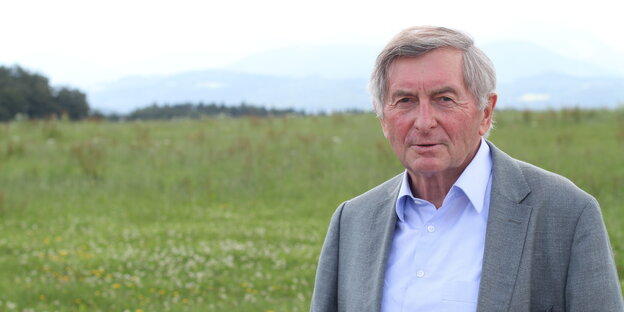Alois Glück has shown that the CSU can also act calmly. Now the former president of the Bavarian parliament has died at the age of 84.

Without shouting, Alois Glück played a key role in determining the fate of the CSU for almost four decades Photo: Dominik Baur
MUNICH taz | “He was one of the greatest and most important politicians in our country,” said Bavarian Prime Minister Markus Söder immediately after the news of the death of CSU politician Alois Glück. Söder spoke of a “strong voice and moral authority that will be greatly missed.” And Klaus Holetschek, Glück's successor as leader of the CSU parliamentary group, added: “For me he was a brilliant political model.” The opposition is also in mourning. Green Party leader Katharina Schulze praised him as “someone who was able to overcome divisions.” In other words: one that could be so necessary today.
On Monday morning, Glück, who played a key role in leading his party for almost four decades, died in a Munich clinic at the age of 84. He made no secret that he did not always agree with the path taken by the CSU in recent years and that he was certainly not happy with it. Even if he wasn't one to shout his displeasure out loud. Alois Glück was the best example of what the CSU can do quietly.
In 2016, when the dispute within the Union over Merkel's refugee policy had just reached its peak, Glück could no longer contain himself and published a 21-page document online expressing his concerns. She modestly called it “a contribution to the debate about the future path of our CSU.” He pointed to a loss of values in the party and an alienation between the CSU and the people. It lacked the social, the Christian, the human.
Later he agreed to talk with the Taz and found clear words, even about those who now rule his party or those who fight with all their might to reach the top. Those who did not share their values or at least did not defend them vigorously. Shortly into the conversation, he backtracked: No, I didn't want to read any of his quotes in the newspaper. Loyalty with the CSU was greater. Despite all the stomachaches, Glück was a party man to the core.
“Social Consciousness of the CSU”
This trained farmer, originally from Chiemgau, was a member of the Bavarian state parliament from 1970 to 2008. In the 1980s he was State Secretary at the Ministry of the Environment for two years. In any case, he was considered one of the pioneers of environmental policy. Starting in 1988 he directed and shaped the CSU parliamentary group for 15 years. In his last term he finally assumed the position of President of the state Parliament.
If Barbara Stamm, also since deceased, had not held the unofficial title of “CSU Social Conscience”, Glück would have been a strong candidate for it. And if his party colleague Josef Göppel had not always been described as the “green conscience of the CSU”, Glück would have deserved that title too.
It was therefore no coincidence that Glück led the round table on species protection in 2019, which was to bring together farmers and environmentalists after the successful referendum on species protection. Just someone who can overcome divisions.
After his active political career, Glück was also very active on a volunteer level: as honorary president of the Bavarian Mountain Rescue Service, in the Hospice Southeast Bavaria network and, above all, as president of the Central Committee of German Catholics ( from 2009 to 2015). ). Faith was already one of his strongest driving forces. He came to politics through the rural Catholic youth movement. If anyone embodied the C and S in the name of the party, it was him.